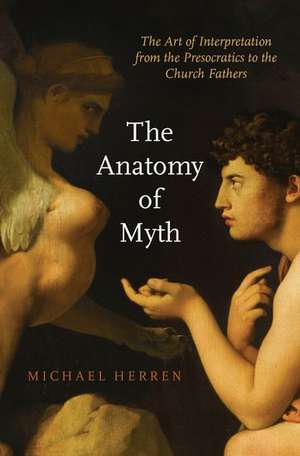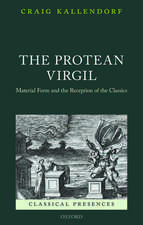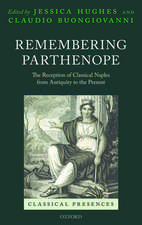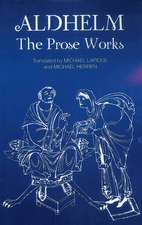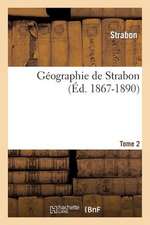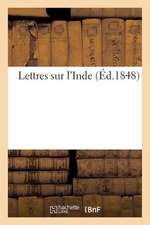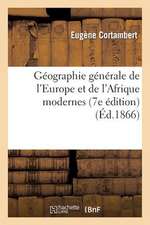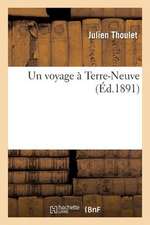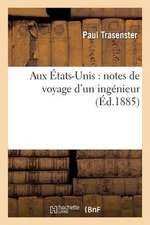The Anatomy of Myth: The Art of Interpretation from the Presocratics to the Church Fathers
Autor Michael Herrenen Limba Engleză Hardback – 22 feb 2017
| Toate formatele și edițiile | Preț | Express |
|---|---|---|
| Paperback (1) | 215.78 lei 31-37 zile | |
| Oxford University Press – 21 dec 2018 | 215.78 lei 31-37 zile | |
| Hardback (1) | 568.40 lei 10-16 zile | |
| Oxford University Press – 22 feb 2017 | 568.40 lei 10-16 zile |
Preț: 568.40 lei
Preț vechi: 756.36 lei
-25% Nou
Puncte Express: 853
Preț estimativ în valută:
108.76€ • 113.86$ • 89.99£
108.76€ • 113.86$ • 89.99£
Carte disponibilă
Livrare economică 04-10 martie
Preluare comenzi: 021 569.72.76
Specificații
ISBN-13: 9780190606695
ISBN-10: 019060669X
Pagini: 248
Dimensiuni: 236 x 160 x 28 mm
Greutate: 0.48 kg
Editura: Oxford University Press
Colecția OUP USA
Locul publicării:New York, United States
ISBN-10: 019060669X
Pagini: 248
Dimensiuni: 236 x 160 x 28 mm
Greutate: 0.48 kg
Editura: Oxford University Press
Colecția OUP USA
Locul publicării:New York, United States
Recenzii
The value of Herren's book should not be underestimated, and I unequivocally recommend it to anyone interested in the history of myth and myth criticism. It is easy and enjoyable to read and filled with a fascinating array of information, making connections that shape into clear and compelling arguments. Tracing different threads through centuries of discussion leaves the reader a dynamic overview of not only contributions of classical authors to ways of interpreting or anatomizing myths, but also how these relate to one another, evolve over time, and link to the cultures and historical contexts in which they emerged and progressed.
An insightful and accessible analytical overview that so many of us need... The value of Herren's book should not be underestimated, and I unequivocally recommend it to anyone interested in the history of myth and myth criticism. It is easy and enjoyable to read and filled with a fascinating array of information, making connections that shape into clear and compelling arguments.
[Herren] claims to have intended his book for students, including those who have no classical knowledge, and it is indeed blissfully free from academic grandstanding or scholarly jargon. The sweep of the story is wide, and within the summary above there are many enjoyable digressions, such as a chapter on ancient historians discussing such things as the historicity of the Trojan War. A dense subject is made an easy read. But Herren has also a serious purpose. He is concerned about the dangers of religious fundamentalism arising from the literalist interpretation of sacred books. His thesis is that the adoption by the Fathers of Greek methods on interpretation, including allegory, enabled the Church to avoid the fundamentalist trap as far as the Renaissance, and that the activity of interpreting authoritative texts, and the freedom to do so, has helped to create 'the society that we currently enjoy'.
This book is a superb presentation of approaches to Greek myth from the Presocratics down to the Church Fathers...Together with a twenty-page glossary, this book is the most useful overview of myth in the ancient world that I have ever read, and I have read many overviews.
An insightful and accessible analytical overview that so many of us need... The value of Herren's book should not be underestimated, and I unequivocally recommend it to anyone interested in the history of myth and myth criticism. It is easy and enjoyable to read and filled with a fascinating array of information, making connections that shape into clear and compelling arguments.
[Herren] claims to have intended his book for students, including those who have no classical knowledge, and it is indeed blissfully free from academic grandstanding or scholarly jargon. The sweep of the story is wide, and within the summary above there are many enjoyable digressions, such as a chapter on ancient historians discussing such things as the historicity of the Trojan War. A dense subject is made an easy read. But Herren has also a serious purpose. He is concerned about the dangers of religious fundamentalism arising from the literalist interpretation of sacred books. His thesis is that the adoption by the Fathers of Greek methods on interpretation, including allegory, enabled the Church to avoid the fundamentalist trap as far as the Renaissance, and that the activity of interpreting authoritative texts, and the freedom to do so, has helped to create 'the society that we currently enjoy'.
This book is a superb presentation of approaches to Greek myth from the Presocratics down to the Church Fathers...Together with a twenty-page glossary, this book is the most useful overview of myth in the ancient world that I have ever read, and I have read many overviews.
Notă biografică
Michael Herren, B.A. (Claremont), M.S.L. (Pontifical Institute of Medieval Studies), Ph.D. (Classics, Toronto), has published and lectured widely on the Latin literature and culture of late antiquity and the early Middle Ages. His work includes critical editions and translations, the history of texts, medieval mythography, and the study of Greek in the Middle Ages. He continues to teach and supervise students at York University and the University of Toronto.
